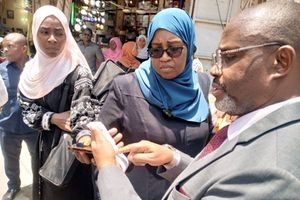Gang- rape case continues today after High Court dismisses appeal

What you need to know:
- The resumption follows a decision by the Dodoma Registry of the High Court of Tanzania to dismiss an appeal concerning the lawyers representing the accused persons in the case.
Dodoma. The case involving four individuals accused of gang rape and sodomy of a young woman from Yombo Dovya, Dar es Salaam, will now proceed today at the Dodoma Resident Magistrates’ Court, it was heard here yesterday.
The resumption follows a decision by the Dodoma Registry of the High Court of Tanzania to dismiss an appeal concerning the lawyers representing the accused persons in the case.
On Wednesday, August 28, the case was postponed in order to accommodate the High Court's decision on a petition for review filed on August 23, 2024.
The trial, which began on August 20, 2024, has seen testimonies from three witnesses before Magistrate Zabibu Mpangule at the Dodoma Resident Magistrate's Court.
But on August 23, lawyer Leonard Mashabara filed a petition requesting the High Court to review the validity of the accused's representation.
Mashabara wass challenging the legitimacy of the lawyers representing the accused—Clinton Damas (Nyundo), Praygod Mushi, Nickson Jackson (Machuche), and Amin Lema (Kindamba) – who are all members of the Tanganyika Law Society (TLS).
The TLS is on record as having issued a statement on August 5, 2024, labeling the accused as criminals and indicating it would cooperate with criminal justice agencies.
Mashabara’s petition sought clarification on whether these lawyers can legally continue defending the accused.
But yesterday, the High Court dismissed the appeal due to the involvement of parties who were not directly related to the original case being heard in the Magistrate court.
The decision was made today by Judge Suleiman Hassan who noted that one of the objections raised by the lawyers representing the accused was that some of the parties involved in the appeal were not relevant to the original case in the lower court.
Specifically, the TLS, the Attorney General, and the defense lawyers were found not to be pertinent to the initial case in the Magistrates’ Court in Dodoma.
“The petition filed by Leonard Mashabara included parties who were not part of the original case in the Magistrates’ Court, which is contrary to legal procedures. Therefore, the court has determined that these petitions are not legally sound and are being dismissed,” Judge Hassan noted.
In the appeal, the defendants were among the parties who chose to represent themselves, while the other petitioners were represented by their lawyers.
The lawyer representing the attorneys defending the accused, Mr Robert Owino, said that the dismissal of the appeal means that the case against the accused will continue as scheduled, provided the petitioners do not appeal the decision.
On the other hand, a lawyer representing Leonard Mashabara, Mr Emmanuel Anthony, argued that while submitting the petition, they had included additional parties they believed were pertinent to the case. However, the High Court found that these parties were not relevant. Anthony confirmed that they accepted the court’s decision and would adjust their petition accordingly. They plan to resubmit the revised petition and expect to have further guidance on the matter soon.
In the main case, the four accused people were arrested and arraigned on Monday, August 19, 2024, after a video clip disclosing the gang rape and sodomy incident went viral on social media in July, sparking anxiety and outrage in the society.
They were arraigned at the Dodoma Resident Magistrate's Court before Principal Resident Magistrate Zabibu Mpangule.





